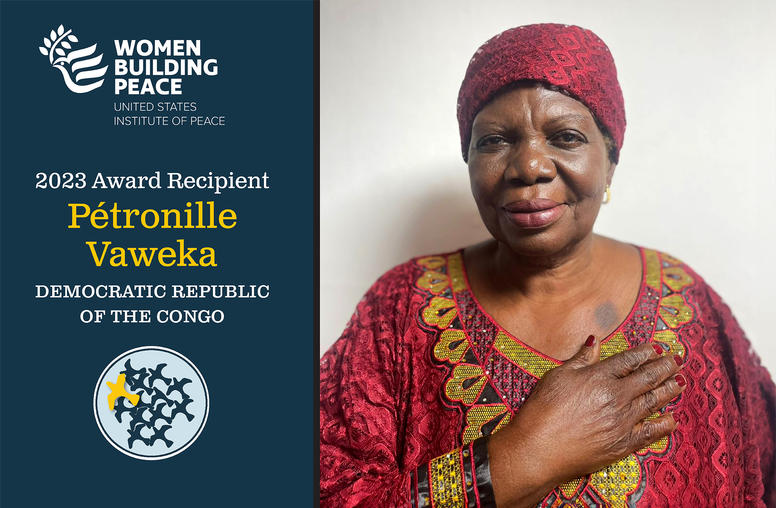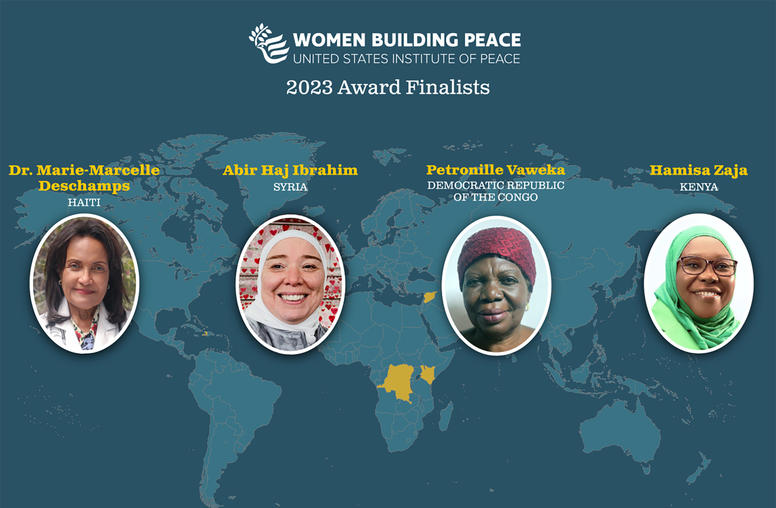A New Day for North Korea
Institute experts available for commentary on Secretary of State Albright's historic trip to North Korea.
This week U.S. Secretary of State Albright makes a historic visit to North Korea -- the first by any secretary of state. It marks the highest official U.S. visit since the end of World War II. What are the stakes for her visit to Pyongyang? Can Kim Jong Il be trusted? How would closer ties between North and South Korea impact regional security? With the UK establishing official diplomatic relations with Pyongyang has the time for containment of North Korea come to an end? Institute specialists Donna Boltz, Richard Christenson, Patrick Cronin, William Drennan, and Chong Whi Kim are available for immediate questions, commentary, and analysis on breaking news developments on North Korea and the future of East Asian stability.
Lt. Col. Donna G. Boltz is a senior fellow at the U.S. Institute of Peace and a career officer in the U.S. Army. Most recently Lt. Col. Boltz commanded the 94th Military Police Battalion in Yongsan, where she was responsible for area security and mobility support operations for the northern half of the Republic of Korea. Throughout her career, Boltz has received numerous awards and decorations including the Defense Superior Service Medal, Legion of Merit, Humanitarian Service Medal (for support to Haitian migrants at Guantanamo Bay), and the NATO medal.
Richard A. Christenson is a senior fellow at the U.S. Institute of Peace on assignment from the U.S. Department of State. Christenson most recently was deputy chief of mission at the U.S. Embassy in Seoul, where he had served previously as chief of political-military affairs. A career diplomat with almost twenty years in the Foreign Service, he has devoted most of his career to Asian affairs. His assignments include postings as the U.S. consul general in Okinawa, Japan, and as deputy director for Korean affairs in the Department of State. Christenson is fluent in both Japanese and Korean. His extensive experience in negotiations with North Korea includes, most notably, having accompanied former President Jimmy Carter on his 1994 visit to North Korea which laid the foundation for the Agreed Framework.
Patrick M. Cronin is director of the Research and Studies program at the U.S. Institute of Peace. He currently heads a study on coercive diplomacy and manages major projects on cross-cultural negotiation, political violence and terrorism, integrated civilian-military planning, and human rights. Prior to joining the Institute of Peace, he was at the National Defense University's Institute for National Strategic Studies (INSS). At INSS Cronin served as deputy director, director of research, and head of Asian Studies. He helped create Joint Force Quarterly, the journal of the Chairman of the Joint Chiefs of Staff, and he subsequently served as the journal's first executive editor. He received the U.S. Army's Civilian Meritorious Service Award and held a commission as an officer in the U.S. Naval Reserve. Cronin is on the editorial advisory board of International Studies Perspectives, the International Journal of Korean Studies, and he is the former associate editor of the journal Strategic Review. He is an elected board member of the Council for Security Cooperation in the Asia Pacific, as well as a long-time member of the Institute for International Strategic Studies, London.
William M. Drennan is a program officer at the U.S. Institute of Peace. A former career officer in the Air Force, Drennan was a senior military fellow at the National Defense University's Institute for National Security Studies from 1995 to 1998 where he concentrated on Korea and Northeast Asia security issues. Prior to that he was a professor of national security policy at the National War College. Drennan has also served as a Military Fellow at the Council on Foreign Relations in New York City; chief of the strategy and policy division, J-5, U.S. Forces Korea; and as the Air Force Aide to President Reagan.
Chong Whi Kim is a senior fellow at the U.S. Institute of Peace and a former national security advisor to the president of South Korea. During his five years as national security advisor, Kim served under five prime ministers, four defense ministers, three foreign ministers, four ministers of national unification, and five directors of South Korea's intelligence agency. With a distinguished career in public service lasting over 40 years, Kim has held a variety of other positions including delegate at the Prime Ministerial South-North Meetings from 1990 to 1992, president of the Korean Committee for the International Institute for Strategic Studies, and for 18 years as deputy director of the Research Institute in National Security Affairs at the National Defense College (Seoul). From 1993 to 1995 he was a distinguished visiting fellow at the Heritage Foundation in Washington DC.
The United States Institute of Peace is an independent, nonpartisan institution established and funded by Congress. Its goals are to help prevent and resolve violent international conflicts, promote post-conflict stability and development, and increase conflict management capacity, tools, and intellectual capital worldwide. The Institute does this by empowering others with knowledge, skills, and resources, as well as by directly engaging in peacebuilding efforts around the globe.

